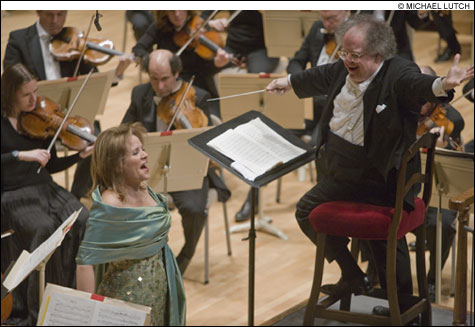
RENÉE FLEMING: She was in her dreamiest, creamiest voice. |
James Levine’s second French program this season with the Boston Symphony Orchestra was more compelling than the one with which he began the season. Instead of all one composer (Ravel), there was a mix: Berlioz, Duparc (the composer known primarily for his songs is a rarity at symphony concerts — the last time the BSO scheduled anything by him was in 1923), Debussy, and the American premiere of a new work by Henri Dutilleux with soprano Renée Fleming, Le temps l’horloge, a BSO co-commission.
The Berlioz was a selection from his “dramatic symphony,” Roméo et Juliette — gorgeous music with one of the great love themes ever written. Levine has conducted the complete score with great success, most recently in a superlative BSO performance in 2004 with the late mezzo-soprano Lorraine Hunt Lieberson. This time, unusually for Levine, I found the performance static, a little square. In Berlioz, especially, I want phrasing that leans into the music, pressing forward, but I didn’t hear that pressure. I certainly heard it in the surging, mercurial, and dazzlingly played La mer (which Levine last led here in 2005); it closed the program with maestro and orchestra capturing Debussy’s intermingling winds and waves.
It was a treat to have Renée Fleming back at Symphony Hall. She was in her dreamiest, creamiest voice both for four exquisite Duparc songs (including his masterful, seductive setting of Baudelaire’s come-hither “L’invitation au voyage”) and for the Dutilleux, though she showed more restraint than full-out abandon. At the end of Duparc’s “Phidylé,” she opened her mouth wide and thrust her head back for the last note, but I couldn’t hear it. Surely with the original and subtler piano accompaniment rather than the composer’s broad orchestration, audibility wouldn’t have been a problem. Luscious as her vocal timbre is, a piano might also have allowed Fleming to vary her tone, to tease the words more.
Dutilleux wrote Le temps l’horloge (“Time [and] the Clock”) with Fleming in mind (she sang the world premiere with the Saito Kinen Orchestra under Seiji Ozawa in Japan this past September), and she sang its three poems with increasing flexibility and expressiveness. The vocal line seems a contemporary take on the melismatic spirals of Ravel’s sad fairy-tale Princess in his enchanting children’s opera, L’enfant et les sortilèges; the orchestral accompaniment is a mysterious, evanescent dreamscape.
The first song, to Jean Tardieu’s brief “Le temps l’horloge” (“I prefer time when it shows itself/Rather than passing than passing among us noiseless/Like a thief in the night”), begins with the syncopated ticking of woodblocks, with a harpsichord fluttering through the texture. Tardieu’s “Le masque” (“The Mask”) is a more surrealistic fantasy. Robert Desnos’s “Le dernier poème” (“The Last Poem”), an old poem he may have been revising when he was in a concentration camp (he survived it but died soon after his release), is a piece of love and longing but also an existential self-portrait (“I’m left to be the shadow among shadows,/To be one hundred times more shadow than the shadow”). Timpani taps, strings, and a startling accordion trigger the sad, solemn song that finally dissolves in the shadow of bassoon and sandpapery flute. Best poem, best setting, best performance — Fleming sang with particular urgency and engagement.